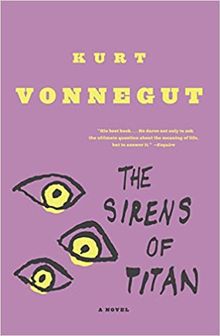To hear Kurt Vonnegut tell it, he didn’t write science fiction. Even if his novels often included time travel, robots, space, and aliens, he felt his books landed firmly in the literary sect. His critics often agreed, but that doesn’t mean he didn’t play a pivotal role in shaping the future of science fiction and fantasy (SFF). From the way he includes SFF elements to explore various themes to outright examining whether science and technology might have more disastrous consequences than the good they intend; Vonnegut opened the door for science fiction to become more accessible and for fantasy to become more grounded.
Here are six Vonnegut classics that defined the SFF genre.

Slaughterhouse-Five
Easily Vonnegut’s most recognized work, Slaughterhouse-Five straddles the genres of science fiction, memoir, and historical fiction. It encompasses Vonnegut’s own experiences of war and tries to make sense of violence on a scale that is impossible to comprehend. So, Vonnegut stretches it beyond the confines of our world, adding otherworldly elements that make it easier to explore and understand. This is what fiction has always been good at, but at the time of publication (1969), science fiction was often centered around taking real-world concepts and exploring the potentiality of them in the future. Slaughterhouse-Five took that examination and projected it into the past, opening the door for SFF to exist in any time and any world—including here and now.

Cat's Cradle
It’s not uncommon to explore religion in SFF, but often that journey takes place within the framework of either actual or perceived gods. Cat’s Cradle takes the reader through Bokononism, a fictional religion that looks at the rigid rules and moral quandaries most modern religions struggle with, but Vonnegut never offers thoughts one way or the other on what the right answers should be. The same is said of the main plot, attempting to find the inventor of a substance that could freeze the planet made by one of the inventors of the atomic bomb. It’s a sideways discussion of whether we should pursue scientific advances—and religion’s role in those advances. It’s about the end of the world, as much of SFF is, but in an unexpected way.

The Sirens of Titan
Vonnegut’s second novel, The Sirens of Titan, might be the novel that embraces fantastical science fiction the most. It largely revolves around a Martian invasion of Earth, as a lot of sci-fi did at the time, but he tells the story through the lens of free will, purpose, and the meaning of life. Many of Vonnegut’s novels tackle these themes, but this is where his voice and style solidified and where he was first nominated for a Hugo. The inventiveness of prose and depth of themes stood out, and while it shaped his career, it also paved the way for other writers to play with their own voice, style, and themes, making the entire SFF genre deeper and more meaningful in the years to come.

God Bless You, Mr. Rosewater, or Pearls Before Swine
Published right before Slaughterhouse-Five, Vonnegut's other 1969 novel shared in its success. But God Bless You, Mr. Rosewater also gave more context to Slaughterhouse-Five, helping with its popularity. While this book is less science fiction than the others, Vonnegut employs science fiction elements through the science-fiction writer character of Kilgore Trout. His stories, which are referenced throughout the book, also feature elements in Vonnegut’s other books, like the aliens from the planet Tralfamadore that then appear in Slaughterhouse-Five.
Filled with sharp satirical commentary on economic inequality, God Bless You, Mr. Rosewater is also the first novel where several of Vonnegut’s themes from other books are first brought together. Outside of the aliens, protagonist Eliot Rosewater appears in future works, and several of his experiences in this novel show up in future works. This integrated universe is something SFF authors use frequently in larger worlds and throughout long careers.

Galápagos
Of all the ideas posited in science fiction, one of the most inventive is the question: Are all modern problems the result of the human brain being too capable? It’s a wild idea and one especially suited for the sharp, satirical nature of Vonnegut’s writing. In Galápagos, we go forward in time, or backwards really, one million years ago, to 1986. We experience the present through the future as the human race evolves through the eyes of a ghost. It’s scientific and existential, and the ghost is none other than Kilgore Trout’s dead son. An inventive story that pushes the bounds of both science fiction and fantasy, Vonnegut showed us that there are no limits, no rules, and definitely no subject that SFF novels can’t explore.

Player Piano
Player Piano was Vonnegut’s debut novel and was firmly in the science fiction genre. Set post World War III where machines have replaced humans in the factories, it’s a satirical commentary on industrialization based largely on his own experiences working for GE. Though the novel was praised, it wasn’t exceptionally successful. But that could be it was ahead of its time. The meaninglessness and indifference people face with advancing technology was too distant at the time but becomes more and more relevant as time passes. Vonnegut didn’t set out to write a science fiction novel. He only captured an idea grown from his interactions at a factory relying on machinery. At the time, he felt that no one took science fiction seriously, that it was meant for adventure and ideas of a far-flung future. In the simple act of writing the book, Vonnegut introduced science fiction concepts to a wider audience, embracing the genre more over time.






